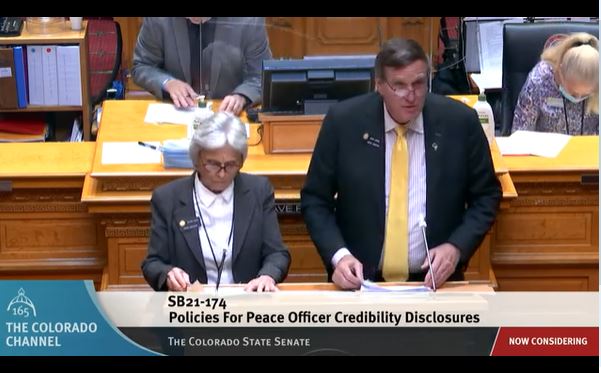By Jeffrey A. Roberts
CFOIC Executive Director
The 2021 Colorado legislative session produced a mixed bag of good and not-so-good developments for those concerned about government transparency.
Topping the disappointing news: Lawmakers approved a bill that lets public bodies disclose just one finalist when choosing a new chief executive officer such as a city manager, university president or school superintendent. House Bill 21-1051 was introduced in response to two district court rulings — one of which was reversed by a 2-1 Colorado Court of Appeals ruling — that determined Colorado’s open-government laws require the public naming of multiple chief executive finalists.
Rather than confirming what the lower courts held, the legislature made sure governments can shroud their hiring processes in secrecy, depriving communities of knowing whether a diverse and well-qualified range of candidates received serious consideration for high-ranking, taxpayer-funded jobs or whether the selection of a candidate was pre-ordained.
Proponents of the bill contended that a public process diminishes the quality of applicants for chief executive positions in government. But in a letter to Gov. Jared Polis, the Colorado Freedom of Information Coalition noted 35 recent examples of jurisdictions that disclosed multiple finalists. “It is our firm belief that those advocating to curtail the amount of information available to the public under existing law — as HB 21-1051 would do — should bear the onus of demonstrating the need to do so,” we wrote to the governor.
Polis let the bill become law without his signature, writing that he agreed with both sides: “In my view, while the bill creates flexibility for organizations by leaving to their discretion the number of finalists who are publicly named, it should remain a best practice to release the names of several finalists. I agree candidates should be entitled to some degree of privacy when applying for positions, so that the highly qualified may apply without fear of embarrassment, retribution, etc. I also agree that public-facing organizations should be held to the highest transparency, accountability, and integrity standards when hiring candidates for vital executive positions.”
Now for some positive developments from the 2021 session: In the final days, legislators passed two police accountability bills with amendments aimed at making law enforcement agencies more transparent.
One of the under-the-radar changes moves up the effective date of a provision passed last year that requires the public release of body-worn camera and dashboard camera footage. Another requires law enforcement agencies that fully encrypt their radio transmissions to create a policy for allowing news media access to “primary dispatch channels.”
A third amendment will require the state’s Peace Officers Standards and Training board to create a publicly available database of “Brady list” officers whose credibility has been called into question. And with a slight wording change, a fourth amendment expands the scope of a groundbreaking 2019 law that opened records on completed police internal affairs investigations.

CFOIC pointed out the limitations of the two-year-old IA records statute in an article last year. Many law enforcement agencies have adhered strictly to language in the law which requires them to release only records “related to a specific, identifiable incident of alleged misconduct involving a member of the public” while an officer is in uniform or on duty. The new language removes the phrase “specific, identifiable” before the word “incident.”
Here is a roundup of other government transparency, freedom-of-information and First Amendment-related bills tracked by CFOIC:
Record sealing. House Bill 21-1214, which passed with bipartisan support, creates additional opportunities for the sealing of lower-level criminal records, including an automatic process for closing public access to many arrest records when no criminal charges have been filed.
The aim, said Rep. Mike Weissman, D-Aurora, is to give people “second chances” to rebuild their lives by removing a barrier to housing and employment. But journalists asked lawmakers to consider how the legislation will hinder their ability to identify systemic problems in the criminal justice system and hold public officials accountable.
“By sealing a wide swath of arrest and conviction records, you will be effectively erasing important information about how specific police, prosecutors and judges do their jobs,” said Susan Greene, who reports for the Colorado News Collaborative and chairs the Colorado Press Association’s advocacy committee. “You would hinder voters’ ability, based on that information, to make fully informed decisions about whether to reelect specific sheriffs and DAs and retain judges. And you would paralyze efforts to, in concrete detail, expose racism, misconduct and other problems with the criminal justice system.”
Metro district transparency. Sent to Polis earlier this week, Senate Bill 21-262 requires special districts to make sure residents can easily access information such as annual reports, budgets and election results. Under an amendment, a district must publish notices of upcoming elections in a newspaper — as currently required — while also disseminating the information another way, such as sending it by mail or posting it on a website.
Nonsubstantive emails. House Bill 21-1025, signed into law by Polis in April, amends the Colorado Open Meetings Law to clarify that elected officials’ electronic communications regarding their availability to meet are not considered “meetings” subject to the law and its notice requirements. The same is now true for messages that forward information, pose questions for future discussions, or respond to inquiries from constituents and other people who are not members of an elected board.
“I don’t think the people of Colorado want us to schedule a meeting to be able to schedule a meeting,” said now-former Rep. Jeni Arndt, the Fort Collins Democrat who introduced the legislation. “That doesn’t seem like the right way to proceed in government.” (Arndt was elected mayor of Fort Collins in April.)
Ballot measure transparency. Also sent to Polis earlier this week, House Bill 21-1321 requires extra information on ballot measures that increase or decrease state or local tax revenue. A measure that increases tax revenue must specify the public services to be funded by the increase. A measure that decreases state tax revenue must specify program areas affected by the reduction, and a measure that decreases local property tax revenue must specify the type of local district affected.
“The Taxpayer Bill of Rights requires that ballot measures that increase state revenue begin with that fiscal impact — shall state taxes be raised by X?” said Rep. Chris Kennedy, D-Lakewood. “However, it doesn’t say for whom those taxes are to be raised, nor does it say when there’s a revenue reduction measure, exactly which programs are likely to be cut. So, we believe that by adding some additional language into the ballot title, we’re really going to do a service to voters, giving them more information with which they can make their decisions about which ballot measures they intend to support.”
Special district board meetings. Special district boards have met over Zoom or some other video-conferencing platform during the COVID-19 pandemic, but they’ve done so without being certain state law permitted their virtual meetings. House Bill 21-1278, passed earlier this week, allows district board meetings to be held in person, by telephone, electronically or in some “other virtual place, or combination of such means.”
Additionally, any meetings held prior to the bill’s effective date are to be considered “validated,” “ratified” and “confirmed,” meaning the manner of meeting cannot be challenged in court.
HOA flags and signs. Lawmakers sent Polis a measure that prohibits homeowners’ associations from banning signs and flags based on their content or message.
Rep. Lisa Cutter, the Jefferson County Democrat who sponsored House Bill 21-1310, said she had received “disturbing reports” from all over the state regarding HOAs “prohibiting Coloradans from freely expressing themselves using signs and flags in their yards.”
The bill allows HOAs to set “reasonable, content-neutral” regulations on the number, location and size of flags and signs. “You couldn’t put a billboard in your front yard,” Cutter said.
Media literacy. Polis signed into law another measure sponsored by Cutter, House Bill 21-1103, that creates an online media-literacy resource bank for Colorado public schools. The legislation, decried by some Republicans as a governmental intrusion on free speech, doesn’t require school districts or charter schools to incorporate any materials from the resource bank into a curriculum. And the Colorado Department of Education, which will maintain the resource bank, must provide a way for the public to recommend that certain materials be removed or included.
Ski area safety. Legislators killed Senate Bill 21-184, which would have required ski area operators to publish death and injury reports as well as safety plans. Chris Romer, president and CEO of the Vail Valley Partnership, said having Colorado be the only state to report injuries could damage the state’s ski communities and tourism industry.
Journalists have been able to piece together some information about ski-area fatalities by requesting county coroners’ records.
Regulating digital communications. As introduced by Sen. Kerry Donovan, D-Vail, Senate Bill 21-132 would have created a new agency to counter “unfair and discriminatory” practices that “promote hate speech,” “undermine election integrity” or “disseminate intentional disinformation, conspiracy theories, or fake news.” The agency could have fined companies such as Twitter, Facebook and YouTube that operated in Colorado without registering.
While critics saw the proposal as having the government police online speech, calling it unconstitutional, Donovan said she would “never do anything to subvert the First Amendment.” A committee rewrote the bill to require a study of how lawmakers might address online consumer issues, but the measure later died in the House.
Nondisclosure agreements. A Senate committee killed Senate Bill 21-023, which would have barred Colorado from using nondisclosure agreements to keep state government employees from talking about “factual circumstances” of their jobs.
“I can’t think of any time where I believe that it would be a good public policy to muzzle state employees regarding their public service, essentially buying the silence of people when they are let go,” said the bill’s sponsor, Sen. Barbara Kirkmeyer, R-Brighton.
But Sen. Pete Lee, D-Colorado Springs, said the proposal “sweeps with too broad of a sword, where more of a nuanced approach might be better suited.”
Follow the Colorado Freedom of Information Coalition on Twitter @CoFOIC. Like CFOIC’s Facebook page. Do you appreciate the information and resources provided by CFOIC? Please consider making a tax-deductible donation.




